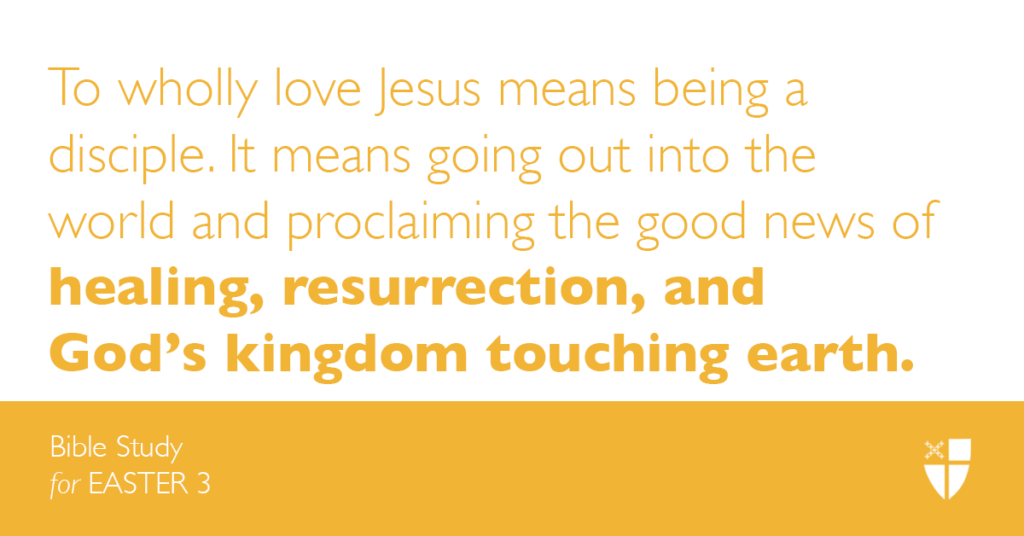This page is available in: Español
Bible Study: Easter 3 (C) – 2019
May 05, 2019

Acts 9:1-6, (7-20)
Saul of Tarsus, the persecutor of Christ-followers, performs his job so thoroughly that Acts describes him as “still breathing threats and murder” (v. 1). Rounding up believers on the Way, binding them up, and sending them to Jerusalem was as innate to him as inhaling and exhaling. We might even presume that Saul took great pride in how effective he was at his occupation. But Jesus has a knack for using the most unlikely characters to do God’s work and to show what true turning-around looks like.
In this instance, perhaps Saul is the reminder that binding is always multi-directional. When we bind others, we are inescapably binding ourselves. Jesus looses Saul’s boundedness with a profound show of light and outward blindness that brings Saul to his knees. Simultaneously, the Lord speaks to a disciple inviting him to facilitate Saul’s healing and final transformation—signaling that none of this transformation and conversion business is accomplished alone. Saul now has inner vision, but can see nothing of the physical world. And for three days he lives in blindness, until Ananias, the disciple, arrives to lay hands on him. Jesus continues to heal, transform, and level the gap between oppressed and oppressor even after the Resurrection. Saul is forced to find another way to order the pattern of his breathing. No more threats or murder, only baptism and proclaiming Jesus.
- Are there actions that are unconsciously second nature to us that we do not realize may be harmful to others?
- When have you experienced healing and/or transformation?
Psalm 30
The psalmist reveals a deeply faithful trust in what God has done and will do in the future. God has healed and restored them to life when all the world was against them. Through this steadfast faith, the psalmist can readily sing praises, dance, and give thanks. Psalm 30 reassures us that when we cry to the Lord, we will not be abandoned. “Weeping may spend the night, but joy comes in the morning” (v. 6).
- “Trust” is such a simple word. Easy to say, but hard to put into action. Has God shown up in such a way that has made you indescribably full of faithfulness?
- When did you last cry out to God?
Revelation 5:11-14
We rarely receive readings from Revelation in our lectionary readings, so when they do come, we should take full advantage of them. Full of imagery, the passage paints a picture full of angels, living creatures, a throne, and singing. So much singing and worship! The excitement of the first Easter communities radiates throughout. Speaking of the “myriads of myriads and thousands of thousands” of angels “singing with full voice” (v. 11-12), the storyteller brings to life the celebration of the Lamb’s sacrifice. The transformative sacrifice that brings with it honor and glory, power and wisdom.
In another moment, the storyteller hears even more singing coming from all directions. All of the heavenly creatures join the angels, along with voices from below and beyond the earth and sea. Everything, including death under the earth, has been defeated and the company of all creatures rejoices at the homecoming of the Lamb.
- Can you imagine the sounds of “singing with full voice?” What does it sound like to you?
- How are you continuing to rejoice in the risen Lord three weeks into the Easter season?
John 21:1-19
Simon Peter feels hurt that Jesus continues to ask if he loves him, and responds with, “Lord, you know everything; you know that I love you” (v. 17). Simon Peter implores upon Jesus that he knows him inside and out, so how could he not feel the enormity of his love? But in Jesus’ responses to Simon Peter, he tells him to “feed my lambs,” “tend my sheep,” “feed my sheep” (v. 15-17), implying that Simon Peter might be missing a second layer of meaning. Yes, Simon Peter loves Jesus. We can see that in the exuberance he displays by jumping out of the boat and into the water when the disciples realize Jesus is standing on the shore. Simon Peter loves Jesus, but still has not quite grasped the encompassing nature of this love. To wholly love Jesus means being a disciple. It means going out into the world and proclaiming the good news of healing, resurrection, and God’s kingdom touching earth.
By all accounts, Simon Peter and the six other disciples are obedient to this call. Jesus taught them to fish, and so in the days following the Resurrection, they head out into the sea looking for fish. They have everything they need. Boat? Check. Net? Check. Who knows if they were in the wrong place at the wrong time, but the fish were not biting. This can sometimes be the case in our present-day efforts to walk the path of discipleship. We have our instructions and all the necessary supplies, and yet we still come up short. Jesus appears and gives the disciples a final nudge, then shows them the path of discipleship. Cast your net to the other side and then let us eat together. And when we have had our fill, “Follow me” (v. 19).
- How do you embody Jesus’ love and share it with others?
- What obstacles are you running into on your path of discipleship?
This page is available in: Español
Don’t forget to subscribe to the Sermons That Work podcast to hear this sermon and more on your favorite podcasting app! Recordings are released the Thursday before each liturgical date.
Receive Free Weekly Sermons That Work Resources!
This page is available in: Español


